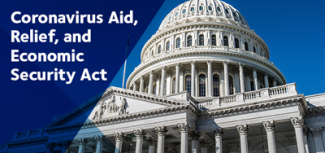
CARES Act
As you’ve probably heard by now, the Coronavius Aid, Relief, and Economic Security Act (the CARES Act) is a $2 trillion federal economic rescue package that has recently been signed into law. What might this mean for you?
Everyone is talking about the stimulus checks that we should all be getting. How much will my check be?
The CARES Act sets aside nearly half a trillion dollars for individual rebate checks to support taxpayers.
There will be a base payment of up to $1,200 for individuals ($2,400 for couples filing jointly), and up to $500 for each dependent child under the age of 17. The payment of $1,200/$2,400 will be phased out starting at $75,000 for single taxpayers and $150,000 for couples filing jointly, based on your most recently-filed tax return.
If the IRS already has your bank account information, you should expect to receive your rebate via direct deposit within a few weeks. If a paper check needs to be mailed, that process may take up to a few months.
There are various calculators online that you can use to estimate the forthcoming rebate for you or your family.
If I need help with cash flow, can I take funds out of one of my retirement accounts?
The 10% penalty that usually applies to distributions for withdrawals prior to age 59 ½ will be waived in 2020, if the funds are used for coronavirus-related purposes (caring for family member with Covid-19 for example, or to replace income lost due to a recent layoff or job loss). Taxes will still need to be paid on the withdrawal, though these can be paid over three years. You will also be able to replace the withdrawn funds, if you choose to do so. These provisions apply to both your IRA account and any retirement plan accounts (like a 401k or 403b) that you may have from prior employers.
Can I borrow from my current employer-sponsored retirement plan?
It depends on whether or not your plan already allows for loans. If so, the CARES Act states that the limit for loans from employer-sponsored retirement plan accounts has been temporarily increased from the usual cap of 50% of the vested balance to 100%, up to $100,000 (an increase from $50,000). If the loan is taken out for coronavirus-related reasons, the due date for repayment of any loan that would normally be due by December 31, 2020, is delayed by one year. That said, we anticipate that this strategy will be slow to be implemented, as employers and plan administrators scramble to accommodate this part of the law.
Will I still have to take my required minimum distribution (RMD) for 2020? I hate the thought of selling investments in a down market.
Good news – the CARES Act has suspended RMDs in 2020. This may be useful for those who take annual RMDs only because they have to meet the requirement, and not because they need the funds to support their living expenses. If you’ve already taken your RMD for 2020, the CARES Act may allow you to return any current-year distributions to the retirement account.
I’ve been laid off, or my work (and income) has completely dried up. What unemployment benefits can I expect to receive?
Unemployment benefits have been increased by $600 per week, on top of what you may normally be able to claim. Benefits have also been extended by 13 weeks, up from 26 weeks in most states. There has also been an expansion of unemployment benefits for those who would not normally qualify, like self-employed individuals and independent contractors. More detailed information from each state's department of labor is expected to be forthcoming.
Is there financial relief for those of us still paying off our student loans?
Borrowers who have federal student loans can have their loan payments suspended, interest-free, through the end of September, 2020. Monthly repayment plans using an auto-debit feature will be automatically suspended until then, and will restart again in October. However, borrowers can choose to continue to make payments, of any amount, during this time, if they are financially able. This may be a good strategy, as borrowers can make progress paying down their loan faster with 0% interest. Your loan servicer can help you opt-out of the forbearance and keep your automatically debited payment. Note that private loans are not eligible, nor are Federal Family Education Loans (FFEL) or Federal Perkins loans which are not owned by the Department of Education.
In short, the federal CARES Act is an unprecedented relief package, the likes of which have never been seen before. These are just a few of its features, and we are all still learning about its many provisions and exactly how they will all be implemented. We will do our best to keep you informed, and we are happy to entertain any questions you may have about how this legislation may affect you. Please don’t hesitate to reach out to us.
Note: This information is gathered from sources believed to be reliable; however, their accuracy cannot be guaranteed.
